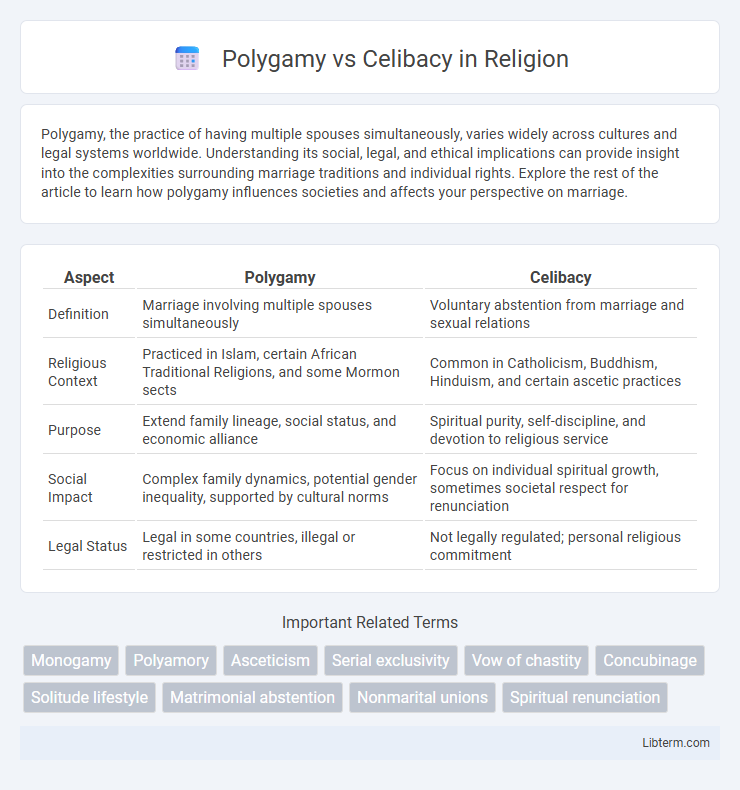Polygamy, the practice of having multiple spouses simultaneously, varies widely across cultures and legal systems worldwide. Understanding its social, legal, and ethical implications can provide insight into the complexities surrounding marriage traditions and individual rights. Explore the rest of the article to learn how polygamy influences societies and affects your perspective on marriage.
Table of Comparison
| Aspect | Polygamy | Celibacy |
|---|---|---|
| Definition | Marriage involving multiple spouses simultaneously | Voluntary abstention from marriage and sexual relations |
| Religious Context | Practiced in Islam, certain African Traditional Religions, and some Mormon sects | Common in Catholicism, Buddhism, Hinduism, and certain ascetic practices |
| Purpose | Extend family lineage, social status, and economic alliance | Spiritual purity, self-discipline, and devotion to religious service |
| Social Impact | Complex family dynamics, potential gender inequality, supported by cultural norms | Focus on individual spiritual growth, sometimes societal respect for renunciation |
| Legal Status | Legal in some countries, illegal or restricted in others | Not legally regulated; personal religious commitment |
Introduction to Polygamy and Celibacy
Polygamy refers to the marital practice where an individual has multiple spouses simultaneously, commonly observed in cultural and religious contexts such as certain African, Middle Eastern, and South Asian societies. Celibacy, in contrast, is the voluntary abstention from marriage and sexual relations, often embraced in religious traditions like Catholicism, Buddhism, and Hinduism to achieve spiritual goals or personal discipline. Both practices reflect deeply rooted social, cultural, and spiritual values influencing individual lifestyles and community norms worldwide.
Historical Perspectives on Marriage and Abstinence
Throughout history, polygamy has been practiced in various cultures as a social structure to ensure lineage and economic stability, especially in ancient African, Middle Eastern, and Asian societies. Celibacy, often rooted in religious and philosophical traditions such as Hinduism, Buddhism, and Catholic monasticism, has been valued as a path to spiritual purity and self-discipline. These contrasting approaches to marriage and abstinence reflect diverse cultural priorities, highlighting the complex relationship between societal norms, religious beliefs, and individual roles.
Cultural Influences on Relationship Choices
Cultural influences significantly shape the acceptance and practice of polygamy and celibacy, with many societies viewing polygamy as a traditional norm tied to social status, religious beliefs, and economic factors. Conversely, celibacy is often embraced in cultures that prioritize spiritual devotion, personal discipline, or ascetic lifestyles, reflecting a commitment to religious or philosophical values. These cultural frameworks deeply inform individuals' relationship choices, impacting societal attitudes, legal regulations, and personal identity.
Religious Views on Polygamy and Celibacy
Religious views on polygamy and celibacy vary significantly across cultures and faiths, shaping norms and moral perspectives. Islam permits polygamy under specific conditions, limiting men to four wives to ensure justice and responsibility, while Christianity generally advocates celibacy or monogamy, especially in Catholicism where celibacy is a vow for clergy. Hinduism embraces celibacy (brahmacharya) as a spiritual discipline but historically includes instances of polygamy among royalty, reflecting diverse doctrinal interpretations and social practices.
Psychological Impacts of Polygamous and Celibate Lifestyles
Polygamous lifestyles often involve complex interpersonal dynamics that can lead to increased stress, jealousy, and emotional strain due to divided attention and competition among partners. Celibacy, embraced voluntarily for personal or spiritual reasons, is linked to increased self-discipline, emotional regulation, and clarity of purpose, but may also result in feelings of loneliness or social isolation if not supported by strong social networks. Psychological research indicates that satisfaction and mental well-being in both lifestyles largely depend on individual choice, social support, and the context in which these practices occur.
Benefits and Challenges of Polygamy
Polygamy offers the benefit of expanding familial support networks and diversifying economic resources, which can enhance social stability in certain cultures. However, it presents challenges such as potential jealousy, unequal resource distribution, and complex inheritance issues that can strain relationships. Legal complications and social stigma also frequently impact the acceptance and practice of polygamous unions.
Benefits and Challenges of Celibacy
Celibacy offers benefits such as enhanced self-discipline, increased focus on personal and spiritual growth, and reduced emotional complications compared to polygamous relationships. Challenges of celibacy include potential feelings of loneliness, societal pressure to conform to traditional relationship norms, and difficulty in fulfilling natural social and physical desires. Maintaining celibacy requires strong mental resilience and a supportive environment to address these psychological and emotional hurdles effectively.
Legal and Ethical Considerations
Polygamy is legally recognized in some countries but banned in many others due to concerns about consent, equality, and potential exploitation, while celibacy faces fewer legal restrictions but raises ethical debates regarding personal autonomy and cultural or religious influences. Ethical considerations in polygamy include the potential for power imbalances and the impact on family dynamics, whereas celibacy is often viewed through the lens of individual choice and societal norms on sexual behavior. Legal frameworks vary widely, with some jurisdictions enforcing strict prohibitions on polygamous marriages and others offering protections for celibate individuals under rights to privacy and freedom of belief.
Social Perceptions and Stereotypes
Polygamy is often associated with cultural traditions and religious practices, leading to social perceptions that range from acceptance in certain communities to stigma and legal challenges in others. Celibacy is frequently viewed as a personal or spiritual choice that garners respect in religious and monastic contexts but may be misunderstood or stereotyped as antisocial or abnormal in secular societies. Social stereotypes surrounding both practices reflect broader societal values regarding marriage, sexuality, and individual freedoms, influencing acceptance and discrimination.
Conclusion: Comparing Polygamy and Celibacy in Modern Society
Polygamy and celibacy represent contrasting approaches to personal relationships and societal roles, each with distinct cultural, legal, and psychological implications. Polygamy often challenges contemporary legal frameworks and equality norms, while celibacy aligns with individual autonomy and spiritual or personal development goals. Modern society increasingly favors celibacy for its adaptability and emphasis on self-determination, reflecting evolving values around personal freedom and social structure.
Polygamy Infographic

 libterm.com
libterm.com